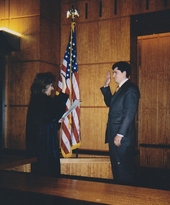It goes without saying that drunkenness is wrong, whether one drives or not, and drunkenness is not condoned. That said, many people are convicted of “drunk” driving who are not drunk. For example, the “legal limit” for driving a commercial vehicle is a blood alcohol content of .004, which is not drunk and few people, if any, have any impairment at .004. There are other circumstances in which perfectly sober people are arrested or even convicted. That said if you follow some simple rules you can likely avoid an arrest and conviction.
1) Have your documents ready in an envelope
Have your drivers license, registration and proof of insurance in an envelope in a handy place, like glove compartment. If stopped you have everything in one spot. Nine times out of ten the arresting officer claims that the driver “fumbled” for license and registration. Fumbling is a purely subjective idea and every cop in every stop can claim you “fumbled” and use that to claim he suspected you were intoxicated. Most people are nervous when cops stop them so they may have trouble getting the documents. Avoid this by having all the docs ready to go. You may wish to keep your driver's license in your car and get a different ID to carry around. If the cop asks you to remove the docs from the envelope ignore him.
2) Exercise your right to remain silent
You have an absolute right to remain silent, so shut up. Do not say a single word. If the cop says “How are you doing tonight?” do not answer. Typically a cop claims he smelled the odor of alcohol on a person’s breath. They always say this whether it is true or not. Don’t say a word and they can’t claim this. Absolutely do not admit to drinking anything ever. Judges generally say admitting to drinking at all provides probable cause for arrest. So shut up. Cops always claim a person is slurring their speech. Don’t give them the opportunity.
If you have recording device, such as cell phone that has a memo option, turn on the recorder so you have a record of the interaction.
3) Lock your doors and only roll down your window one quarter of an inch to give the cop your papers then roll the window back up
Again, cops will claim they smell alcohol from your breathing. They can’t claim that if the window is closed. They may tell you to roll down the window, but you have no legal obligation to do so. Keep the window closed, and shut up. Make sure the door is locked so the cop cannot open it.
4) Do not get out of the car
In New Jersey and in most states you have no obligation to get out of the car if a cop tells you to. In fact, nine times out of ten the cop will say he did not order a person out of the car he only “requested” and the person did it voluntarily. Under New Jersey case law a cop is not even permitted to request a driver to get out of the car unless he has reasonable suspicion of an offense such as DUI. If you have followed the above instructions the cop has no reasonable suspicion. Regardless, stay in the car. You may reach a point at which the cop pulls his gun and points it at you and tells you to get out of the car. You still don’t have a legal obligation to get out, but if you do you have still accomplished several important things: 1) no one can possibly think an order at gun point is a "request", 2) if the cop claims you were nervous and stumbled getting out of car, that is expected you have someone sticking a gun in your face, 3) how can you expected to calmly recite the alphabet or count backwards when someone has just threatened to shoot you 4) pulling the gun and ordering you out likely constitutes an arrest, which means the cop must have “probable cause” of a DUI not just suspicion. So you have probably just tricked the cop into arresting you before he can complete his investigation.
5) Do not take any field sobriety tests or a portable breath test
Under New Jersey law you are not required to submit to any field sobriety tests (FST) or a portable breath test (PBT). FSTs are highly subjective, and a cop can always claim you failed. What is more, if a cop is demanding you do FST he likely has concluded that you are drunk. You will never convince a cop you are not drunk. We all suffer from “confirmation bias.” Confirmation bias means if you think something is true the things you observe will be skewed towards proving it is true. PBTs are not accurate and not admissible as evidence at trial, but any sort of positive reading for alcohol can be used to support probable cause for arrest.
Arrest for DUI requires the cop to have probable cause of intoxication. Usually the cop claims one or more of the following: 1) fumbled for papers, 2) slurred speech, 3) odor of alcohol 4) admitted drinking, 5) swaying getting out of vehicle, 6) did not perform adequately on FSTs, and 7) PBT indicated presence of alcohol. You can prevent the police from being able to even claim any of these things exist. If you are arrested without probable cause then any evidence obtained as a result of the arrest is thrown out (suppressed) and you have a civil suit for false arrest.
The above is true based on New Jersey and Alaska law. Other states may have other requirements.
If you are arrested, then look at Five Rules to Avoid DUI Conviction after arrest.
